
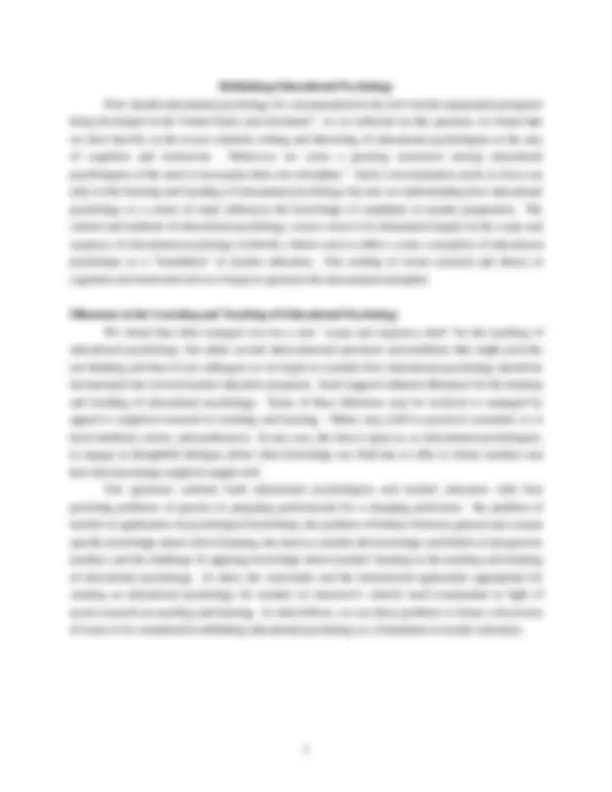

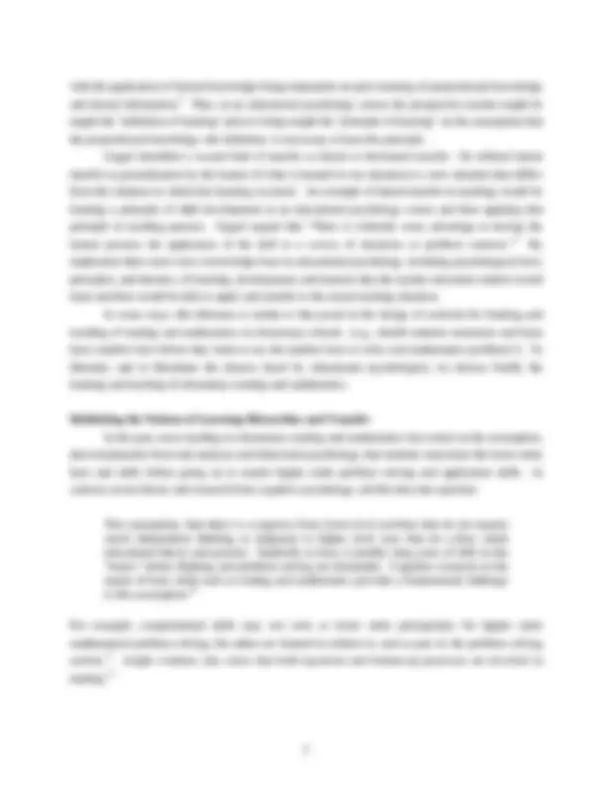
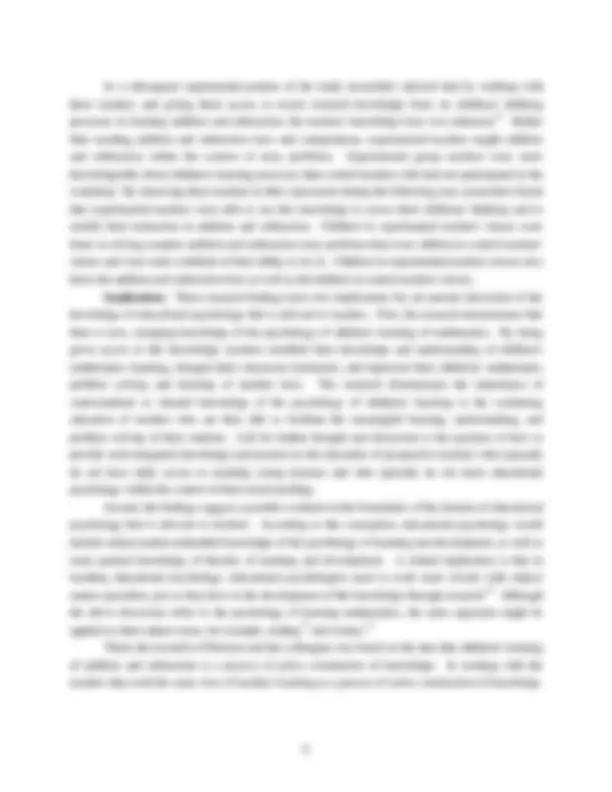
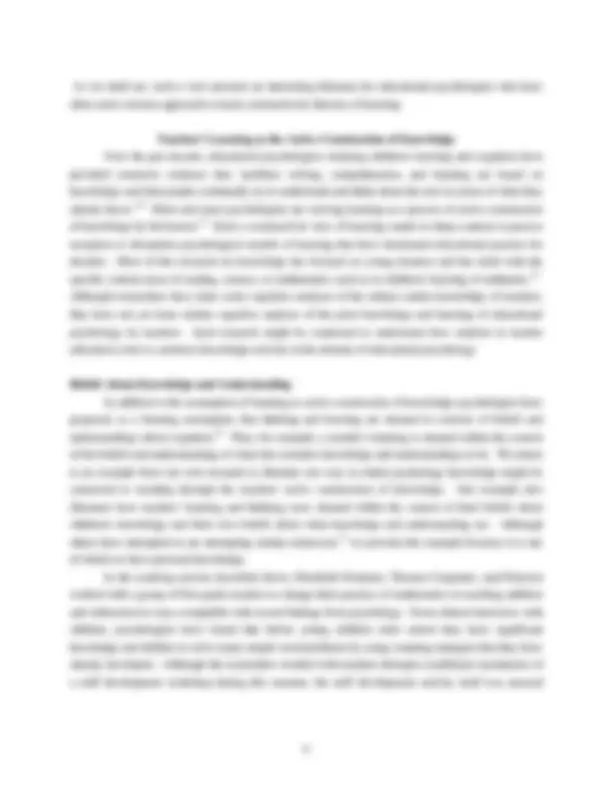
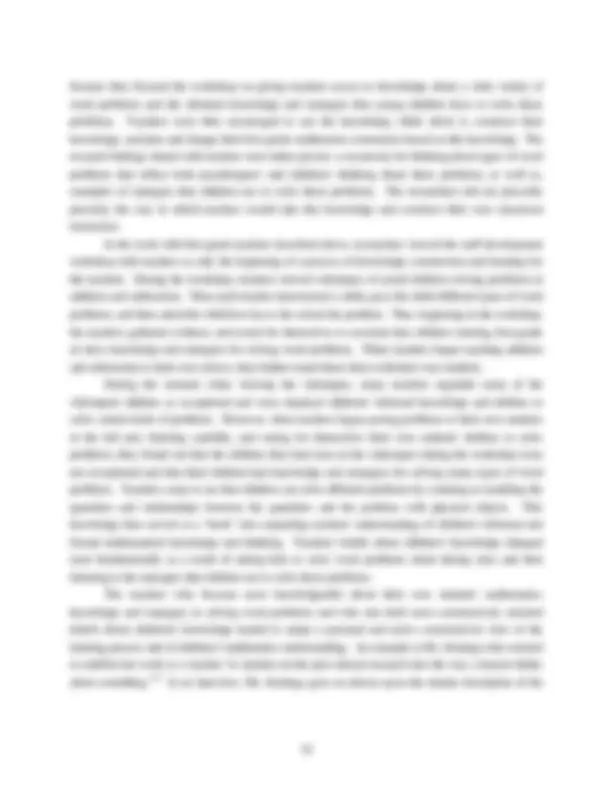
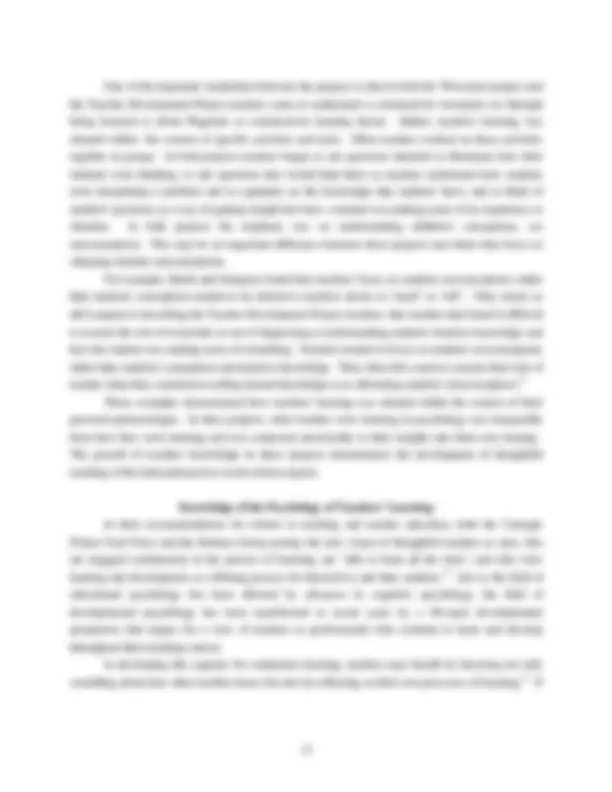
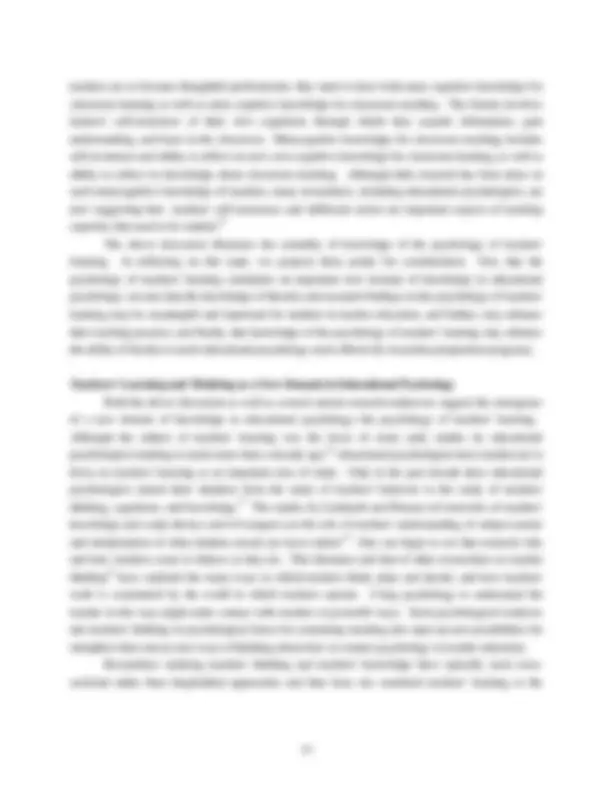
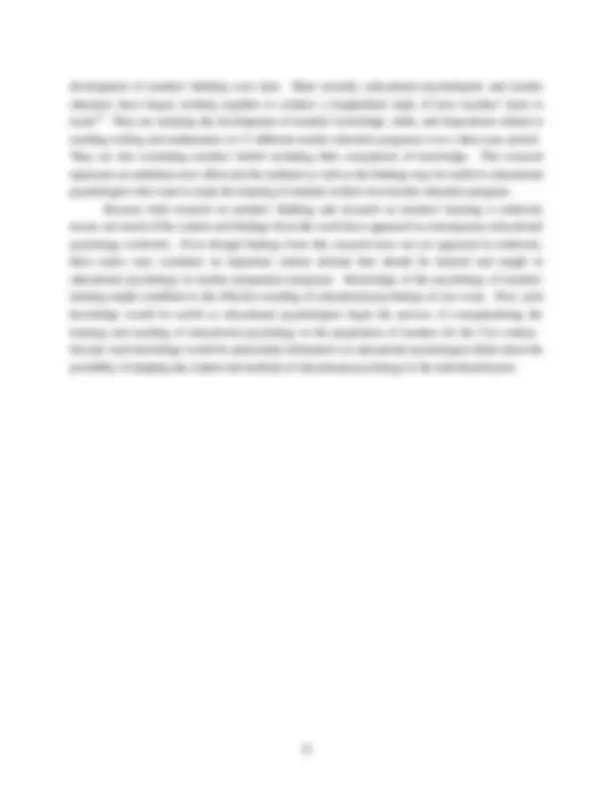
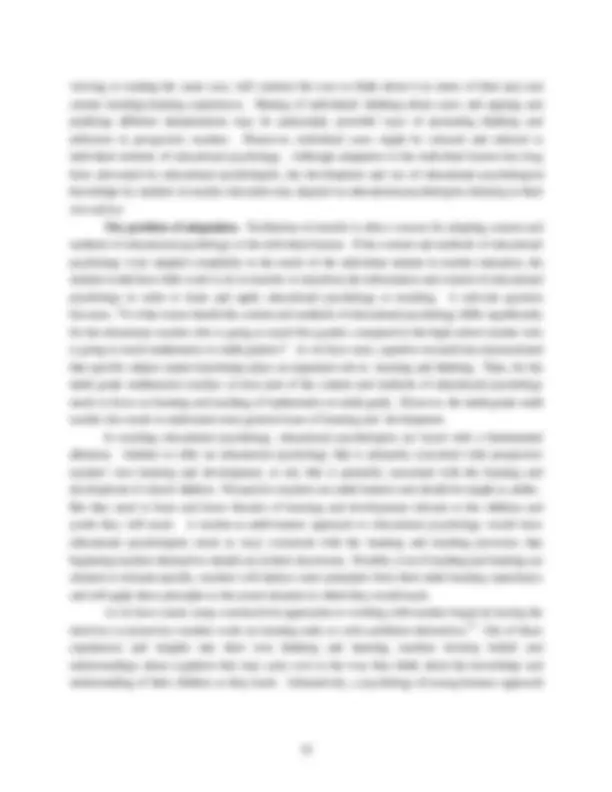
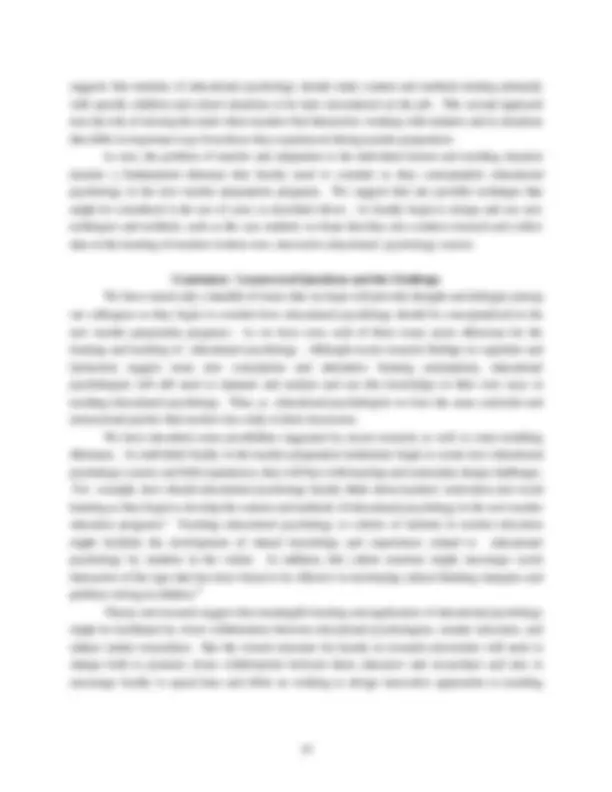
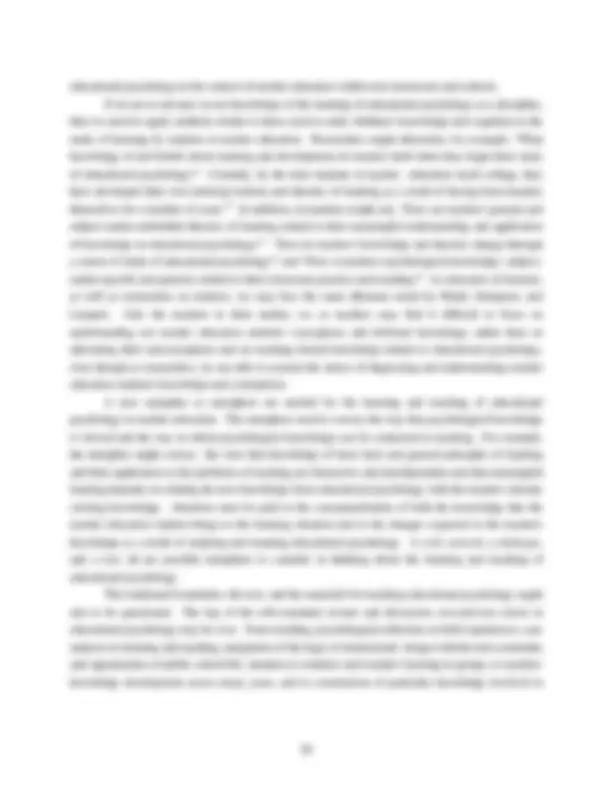

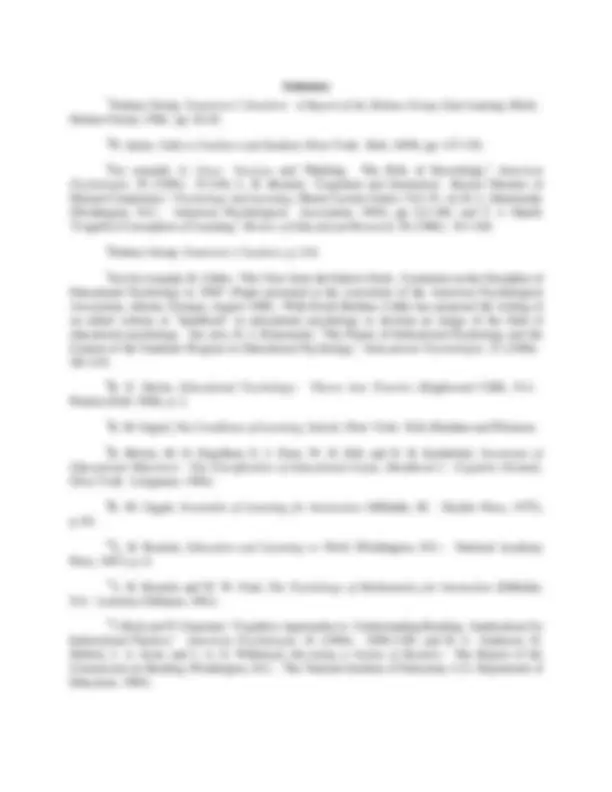
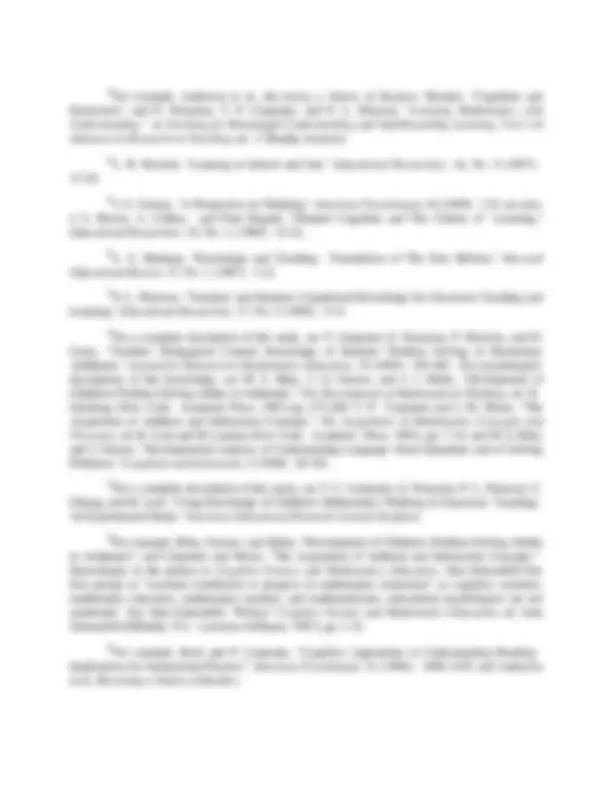
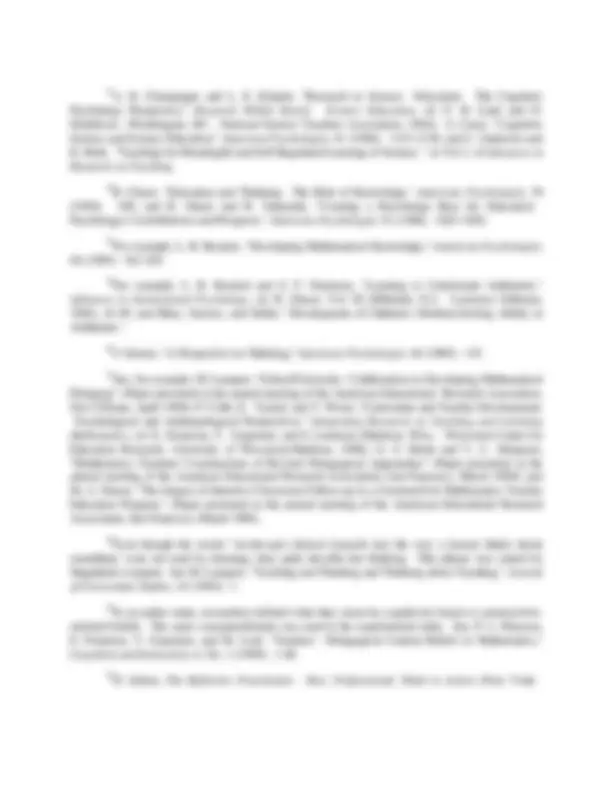
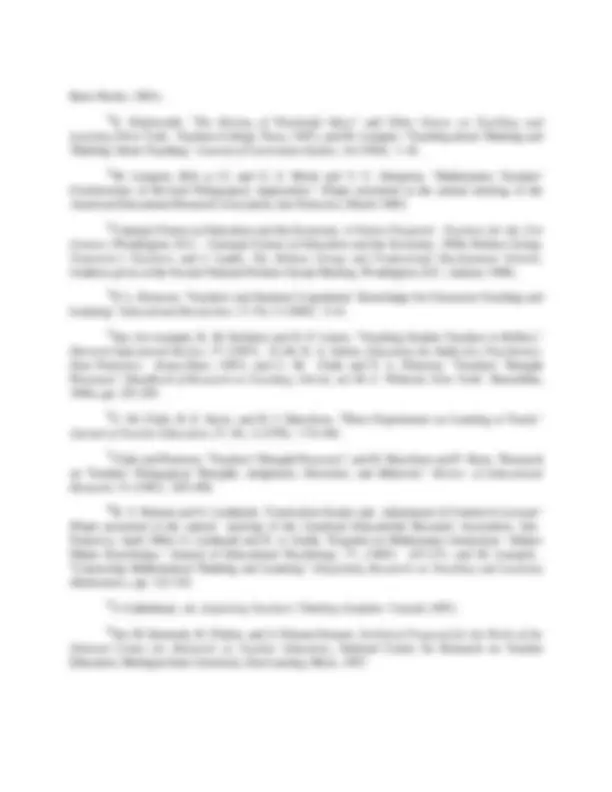
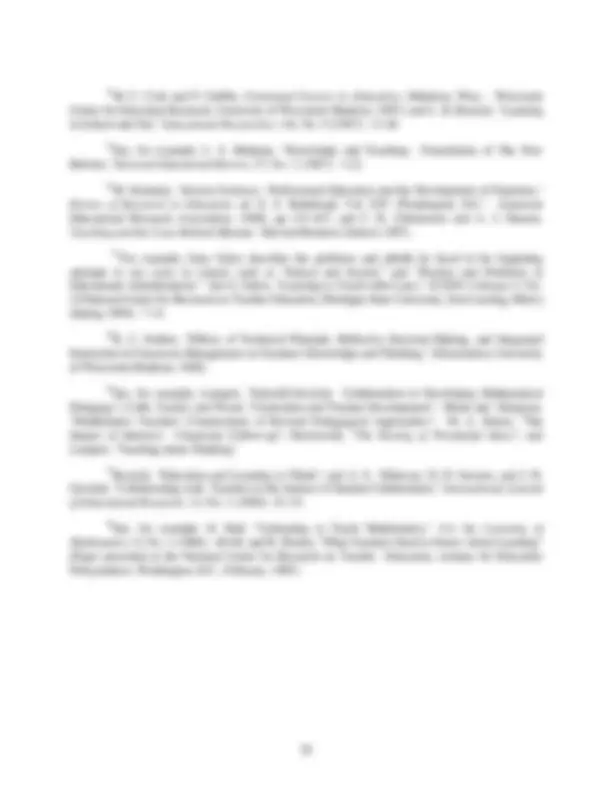


Study with the several resources on Docsity

Earn points by helping other students or get them with a premium plan


Prepare for your exams
Study with the several resources on Docsity

Earn points to download
Earn points by helping other students or get them with a premium plan
Community
Ask the community for help and clear up your study doubts
Discover the best universities in your country according to Docsity users
Free resources
Download our free guides on studying techniques, anxiety management strategies, and thesis advice from Docsity tutors
This paper is all about Psychological Foundation of Education
Typology: Study notes
1 / 26

This page cannot be seen from the preview
Don't miss anything!



















Penelope L. Peterson, Christopher M. Clark, and W. Patrick Dickson**
The way in which teachers are educated and supported to meet the challenges of the 21st century has become a contended issue. In raising alarm, criticizing the status quo, and making recommendations, various study groups and blue ribbon panels have focussed on economic issues, equity and excellence, the need for more rigorous subject matter preparation, and on the restructuring of incentives and the career ladder for teachers. Although considerable agreement exists about the need for improvement in teacher education and professional development, wide differences of opinion are apparent about where to concentrate limited resources. These differences of opinion will probably persist as the recommendations and mandates of the 1980s become the legislation, regulations, and redesigned teacher preparation programs of the 1990s. But whatever programs and designs emerge from the present period of scrutiny, research, and revision in teacher education, we are confident that each route to certification will include substantial attention to learners, learning, and human development. For, in the broadest sense, the roles and purposes of teachers will continue to focus on the facilitation of learning and development by each student, to the practical limits of teachers' abilities. Consider what one portrait of future teachers implies about their knowledge of learning and development. Such teachers would
possess broad and deep understanding of children, the subjects they teach, the nature of learning and schooling, and the world around them. They exemplify the critical thinking they strive to develop in students, combining tough-minded instruction with a penchant for inquiry.... Competent teachers are careful not to bore, confuse, or demean students, pushing them instead to interact with important knowledge and skill. Such teachers interpret the understandings that students bring to and develop during lessons; they identify students' misconceptions, and question their surface responses that mask true learning.^1
The above quote portrays a teacher who has deep knowledge of the psychology of learning, development, and instruction; who is able to apply and draw on this psychological knowledge in her own teaching; who is able to transform this knowledge when necessary to adapt to new learning situations and learners; and who is continuously adding to and developing psychological knowledge
*This will appear as an article in Teachers College Record in Spring 1990. **Penelope L. Peterson is co-director of the Center for the Learning and Teaching of Elementary Subjects and professor in the Department of Counseling, Educational Psychology and Special Education at Michigan State University. Christopher M. Clark is a professor in the department and W. Patrick Dickson is chair of the department.
through informal inquiry, as well as through formal education. Thus, knowledge of the domain of educational psychology is central to the teaching enterprise and to the preparation of teachers. It was less than a century ago that William James, in his Talks to Teachers , made the argument for including psychology in the preparation of teachers. At that time, psychology was an infant science with only the sketchiest understanding of the human learner and human cognition. Since then, educational psychologists have filled in much detail in the explanation of human cognition that James put forth:
The gist of the matter is this: Every impression that comes in from without, be it a sentence which we hear, an object of vision, or an effluvium which assails our nose, no sooner enters our consciousness than it is drafted off in some determinate direction or other, making connection with the other materials already there, and finally producing what we call our reaction.... The impression arouses its old associates; they go out to meet it; it is received by them, recognized by the mind.... It is the fate of every impression thus to fall into a mind preoccupied with memories, ideas, and interests, and by these it is taken in. This way of taking in the object is the process of apperception.... The apperceived impression is engulfed in this, and the result is a new field of consciousness, of which one part (and often a very small part) comes from the outer world, and another part (sometimes by far the largest) comes from the previous contents of the mind.^2
Although James' vision of the learner anticipated much of the work by contemporary educational psychologists on cognition and instruction, today educational psychologists have more to contribute to the teaching-learning enterprise than they did a century ago. For example, in the last decade research on learning has revealed a great deal about students' conceptions and misconceptions and has shown how the knowledge that students bring to the teaching-learning situation affects substantially what and how students learn.^3 William James' broad and general claims about learning have been supported and elaborated by subject-matter specific research on teaching and school learning. Although one prominent source of proposals for reform of teacher preparation, the Holmes Group, drew significantly on recent theory and research in the psychology of learning and teaching in portraying the ideal teacher, their report left the re-formulation of educational psychology as a course of study undefined. The Group's only caveat was that "professional courses of study in education should meet the standards of the core disciplines from which they derive; that is educational psychology must be sound psychology."^4 Now that many institutions are attempting to build on such general recommendations to reform their teacher education programs, faculty need to begin to explicate, more specifically, the learning and teaching of educational psychology in the preparation of teachers for the 21st century.
The Problem of Transfer Educational psychology is taught as a foundation course in most teacher education programs, and at least one course on the psychology of human learning is typically required for teacher certification by most states. Typically, in most colleges and universities teacher education majors take a course or courses in the psychology of learning, development, and instruction prior to taking their methods courses, practicum experiences, and to doing their actual teaching in schools. The pattern, sequencing, and methods of teaching educational psychology make implicit assumptions about teachers' knowledge about learners and learning. An underlying rationale for the timing and format of educational psychology courses is that teacher education majors need the basic factual information and conceptual knowledge of the psychology of learning, development, and instruction to be able to apply this knowledge in their clinical teaching experiences, in their methods courses, and, eventually, in their classroom teaching. Thus, the teaching of educational psychology as a foundation in teacher education has rested on certain classic but typically, unquestioned, psychological assumptions about the learning and the transfer of learning of the prospective teacher to teaching.
Unquestioned Assumptions Underlying Psychology as a Foundation From early attempts to extrapolate laws of learning from laboratory studies of animal learning to the present writers of contemporary educational psychology textbooks who still harken back to some "rather obvious principles known since the beginning of this century," educational psychologists have framed the problem as one of transfer of learning from one situation to another, or from in school to out of school.^6 Gagné introduced the concepts of vertical transfer and horizontal transfer--two concepts that have affected significantly the content and methods of teaching educational psychology for the past two decades. In his theory of vertical transfer , Gagné posited the idea that learning of lower level skills in a learning hierarchy facilitates the learning of higher level skills in the hierarchy because they serve as prerequisites for those higher level skills as follows:
In vertical transfer, intellectual skills exhibit transfer to "higher-level" skills, that is, to skills which are more complex.... The intellectual skill of multiplying whole numbers, for example, is a part of the more complex skills of dividing, adding, and multiplying fractions, finding square roots, solving proportions, and many others. Transfer to the learning of these more complex skills is dependent primarily on the prior learning of the simpler skills. The more basic skills must be "mastered," in the sense that they can be readily retrieved, in order for transfer to take place to the learning of the more complex intellectual skills. This principle is illustrated by the learning hierarchy.^7
While Gagné's description of vertical transfer seems to pertain more to the learner's procedural knowledge, Bloom et. al's Taxonomy of Educational Objectives sets forth a similar hierarchical model
with the application of factual knowledge being dependent on prior learning of propositional knowledge and factual information.^8 Thus, in an educational psychology course the prospective teacher might be taught the "definition of learning" prior to being taught the "principle of learning" on the assumption that the propositional knowledge--the definition--is necessary to learn the principle. Gagné identified a second kind of transfer as lateral or horizontal transfer. He defined lateral transfer as generalization by the learner of what is learned in one situation to a new situation that differs from the situation in which the learning occurred. An example of lateral transfer in teaching would be learning a principle of child development in an educational psychology course and then applying that principle in teaching practice. Gagné argued that "There is evidently some advantage to having the learner practice the application of the skill to a variety of situations or problem contexts."^9 By implication there must exist a knowledge base in educational psychology, including psychological facts, principles, and theories, of learning, development, and learners that the teacher education student would learn and then would be able to apply and transfer to the actual teaching situation. In some ways, this dilemma is similar to that posed in the design of curricula for learning and teaching of reading and mathematics in elementary schools (e.g., should students memorize and learn basic number facts before they learn to use the number facts to solve real mathematics problems?). To illustrate, and to illuminate the choices faced by educational psychologists, we discuss briefly the learning and teaching of elementary reading and mathematics.
Rethinking the Notions of Learning Hierarchies and Transfer In the past, most teaching in elementary reading and mathematics has rested on the assumption, derived primarily from task analyses and behavioral psychology, that students must learn the lower order facts and skills before going on to master higher order problem solving and application skills. In contrast, recent theory and research from cognitive psychology call this idea into question:
This assumption--that there is a sequence from lower level activities that do not require much independent thinking or judgment to higher level ones that do--colors much educational theory and practice. Implicitly at least, it justifies long years of drill on the "basics" before thinking and problem solving are demanded. Cognitive research on the nature of basic skills such as reading and mathematics provides a fundamental challenge to this assumption.^10
For example, computational skills may not exist as lower order prerequisites for higher order mathematical problem solving, but rather are learned in relation to, and as part of, the problem solving activity.^11 Ample evidence also exists that both top-down and bottom-up processes are involved in reading.^12
Teachers' General vs. Subject-Matter-Embedded Knowledge of Learning An important beginning question is how to think about teachers' knowledge of the principles and theories of learning and development that define much of the domain of knowledge in educational psychology that is relevant to teachers. Such knowledge is what comprises most of the texts currently used in educational psychology courses for teachers. It includes what Shulman has referred to as knowledge of learners and their characteristics--as well as aspects of what he has identified as pedagogical content knowledge:
The conceptual and procedural knowledge that students bring to the learning of a topic, the misconceptions they may have developed, and the stages of understanding that they are likely to pass through in moving from a state of having little understanding of the topic to mastery of it. It also includes knowledge of techniques for assessing students' understandings and diagnosing their misconceptions.^16
The above knowledge clearly concerns the psychology of learning even though it is embedded within a specific subject or content area. Relevant knowledge also includes teachers' content-specific cognitional knowledge or teachers' awareness of the mental processes or cognitions by which learners acquire subject-specific knowledge through classroom learning.^17 To illustrate a possible way in which educational psychologists might think differently about the knowledge that teachers need to develop about the psychology of learning, we use as an example from recent research that Peterson conducted with her colleagues Thomas Carpenter and Elizabeth Fennema at the University of Wisconsin-Madison. In this study researchers tried to make accessible to teachers some knowledge from psychological research on children's learning of addition and subtraction. Because recent research had shown the importance of initial knowledge, researchers began by asking to what extent teachers already have this knowledge: (a) What do teachers know about the distinctions that young learners naturally make between addition and subtraction problems types? and (b) What do teachers know about the strategies that children use to solve different addition and subtraction word problems? They assessed teachers' knowledge through questionnaires and an interview and found that, in general, most of the 40 first-grade teachers were able to identify many of the critical distinctions between addition and subtraction word problems and the primary strategies that children use to solve such problems. However, teachers' knowledge generally was not organized into a coherent network that related distinctions between problems, children's strategies, children's solutions, and problem difficulty. Given that it took many years of research for psychologists to arrive at such knowledge, perhaps it is not surprising that teachers did not have this in-depth and coherent network of knowledge of young childrens' learning of addition and subtraction.^18
In a subsequent experimental portion of the study researchers showed that by working with these teachers and giving them access to recent research knowledge from on childrens' thinking processes in learning addition and subtraction, the teachers' knowledge base was enhanced.^19 Rather than teaching addition and subtraction facts and computations, experimental teachers taught addition and subtraction within the context of story problems. Experimental group teachers were more knowledgeable about childrens' learning processes than control teachers who had not participated in the workshop. By observing these teachers in their classrooms during the following year, researchers found that experimental teachers were able to use this knowledge to assess their childrens' thinking and to modify their instruction in addition and subtraction. Children in experimental teachers' classes were better at solving complex addition and subtraction story problems than were children in control teachers' classes and were more confident of their ability to do so. Children in experimental teachers classes also knew the addition and subtraction facts as well as did children in control teachers' classes. Implications. These research findings have two implications for our present discussion of the knowledge of educational psychology that is relevant to teachers. First, the research demonstrates that there is new, emerging knowledge of the psychology of children's learning of mathematics. By being given access to this knowledge, teachers modified their knowledge and understanding of children's mathematics learning, changed their classroom instruction, and improved their childrens' mathematics problem solving and learning of number facts. The research demonstrates the importance of contextualized or situated knowledge of the psychology of childrens' learning to the continuing education of teachers who are then able to facilitate the meaningful learning, understanding, and problem solving of their students. Left for further thought and discussion is the question of how to provide such integrated knowledge and practice in the education of prospective teachers who typically do not have daily access to teaching young learners and who typically do not learn educational psychology within the context of their actual teaching. Second, the findings suggest a possible evolution in the boundaries of the domain of educational psychology that is relevant to teachers. According to this conception, educational psychology would include subject-matter-embedded knowledge of the psychology of learning and development, as well as more general knowledge of theories of learning and development. A related implication is that in teaching educational psychology, educational psychologists need to work more closely with subject matter specialists, just as they have in the development of this knowledge through research.^20 Although the above discussion refers to the psychology of learning mathematics, the same argument might be applied to other subject areas, for example, reading^21 and science.^22 Third, the research of Peterson and her colleagues was based on the idea that children's learning of addition and subtraction is a process of active construction of knowledge. In working with the teachers they took the same view of teachers' learning as a process of active construction of knowledge.
because they focused the workshop on giving teachers access to knowledge about a wide variety of word problems and the informal knowledge and strategies that young children have to solve these problems. Teachers were then encouraged to use the knowledge, think about it, construct their knowledge, and plan and change their first-grade mathematics instruction based on this knowledge. The research findings shared with teachers were rather precise--a taxonomy for thinking about types of word problems that reflect both psychologists' and childrens' thinking about these problems, as well as, examples of strategies that children use to solve these problems. The researchers did not prescribe precisely the way in which teachers would take this knowledge and construct their own classroom instruction. In the work with first-grade teachers described above, researchers viewed the staff development workshop with teachers as only the beginning of a process of knowledge construction and learning for the teachers. During the workshop, teachers viewed videotapes of actual children solving problems in addition and subtraction. Then each teacher interviewed a child, gave the child different types of word problems, and then asked the child how he or she solved the problem. Thus, beginning in the workshop, the teachers gathered evidence and tested for themselves to ascertain that children entering first-grade do have knowledge and strategies for solving word problems. When teachers began teaching addition and subtraction to their own classes, they further tested these ideas with their own students. During the summer when viewing the videotapes, many teachers regarded some of the videotaped children as exceptional and were skeptical childrens' informal knowledge and abilities to solve certain kinds of problems. However, when teachers began posing problems to their own students in the fall and, listening carefully, and seeing for themselves their own students' abilities to solve problems, they found out that the children they had seen on the videotapes during the workshop were not exceptional and that their children had knowledge and strategies for solving many types of word problems. Teachers came to see that children can solve different problems by counting or modeling the quantities and relationships between the quantities and the problem with physical objects. This knowledge then served as a "hook" into expanding teachers' understanding of children's informal and formal mathematical knowledge and thinking. Teachers' beliefs about children's knowledge changed most fundamentally as a result of asking kids to solve word problems aloud during class and then listening to the strategies that children use to solve those problems. The teachers who became most knowledgeable about their own students' mathematics knowledge and strategies in solving word problems and who also held most constructively oriented beliefs about childrens' knowledge tended to adopt a personal and active constructivist view of the learning process and of childrens' mathematics understanding. An example is Ms. Jennings who seemed to redefine her work as a teacher "to include on-the-spot clinical research into the way a learner thinks about something."^28 In an interview, Ms. Jennings gave an almost up-to-the minute description of the
knowledge of a particular first-grade child in her class:
I was working with Cheryl the other day, and she had 12 cubes in her hand. The problem was Ms. Riva had 12 carrots, and she made three carrot cakes. She needed to divide them equally into each cake. And you know, Cheryl had these cubes, and go, go, go--she snapped it off real quick. I said, "How did you get that so quickly?" And she goes, "Oh, you know the numbers, you know--first there were three. If you put three cakes, three carrots in each cake, and then I had nine. But if I add one more, that would be four." So they [the children] are thinking. It's just so sophisticated. It just seems to come together for them.
Teachers who experienced the workshop differed in the extent to which they knew and believed that children enter first grade with useful problem-solving knowledge. Some teachers like Ms. Jennings, Donaldson, Taylor, Miller, and Pruitt clearly knew and believed that children have their own knowledge. For example, Ms. Pruitt referred specifically to children's knowledge as their own, and Ms. Jennings described the sophistication of her students' own knowledge. Donaldson noted how questioning, listening to, and observing children's problem solving strategies made her "realize how many children can do these things [problem solving] in different ways" and that "we were trying to mold them into one of way of doing that. It's exciting to see what they [children] can do without us molding." In a very real sense, these teachers began engaging in psychological research into their own students' mathematical thinking. These five teachers were the highest among the 20 workshop teachers in having cognitively based or constructivist-oriented beliefs about children's knowledge.^29 However, even these teachers varied in the extent to which they were in classroom process. We did find that these five teachers were significantly higher than the other teachers in the amount of time they spent listening to processes that their students were using to solve problems. These teachers were taking seriously the processes the children use to solve problems and were attending to the knowledge that their students had. Ms. Jennings, the most constructivist teacher in her classroom practice, clearly listened to determine the knowledge of mathematics that her students had, and then she used that information to decide what to teach, given where the child was in his or her thinking. The following excerpt captures Ms. Jennings' approach:
Some first graders don't need to be introduced to addition. I think teachers do kids injustice when they drill on things that kids already know, because kids get bored. I found my kids a lot more exciting. I was more excited, and I tried to give things to them and really listen to them... before the holidays one kid said, "5 times 5 is 25, take away 20 is 5," and my mouth dropped open. And I said, "Oh, they are ready for multiplication." And not everybody was, but some kids were, and so then it my
One of the important similarities between the projects is that in both the Wisconsin project and the Teacher Development Project teachers came to understand a constructivist viewpoint not through being lectured to about Piagetian or constructivist learning theory. Rather, teachers' learning was situated within the context of specific activities and tasks. Often teachers worked on these activities together in groups. In both projects teachers began to ask questions intended to illuminate how their students were thinking; to ask questions that would help them as teachers understand how students were interpreting a problem and to capitalize on the knowledge that students' have; and to think of students' questions as a way of gaining insight into how a student was making sense of an experience or situation. In both projects the emphasis was on understanding children's conceptions, not misconceptions. This may be an important difference between these projects and others that focus on changing students misconceptions. For example, Monk and Stimpson found that teachers' focus on students mis conceptions rather than students' conceptions tended to be related to teachers' desire to "teach" or "tell". They noted, as did Lampert in describing the Teacher Development Project teachers, that teachers had found it difficult to assume the role of researcher as one of diagnosing or understanding students' intuitive knowledge and how the student was making sense of something. Teachers tended to focus on students' mis conceptions rather than students' conceptions and intuitive knowledge. They often felt a need to assume their role of teacher when they construed as telling formal knowledge or as alleviating students' misconceptions.^32 These examples demonstrated how teachers' learning was situated within the context of their personal epistemologies. In these projects, what teachers were learning in psychology was inseparable from how they were learning and was connected inextricably to their insights into their own leaning. The growth of teachers knowledge in these projects demonstrates the development of thoughtful teaching of the kind portrayed in recent reform reports.
Knowledge of the Psychology of Teachers' Learning In their recommendations for reform in teaching and teacher education, both the Carnegie Forum Task Force and the Holmes Group portray the new vision of thoughtful teachers as ones who are engaged continuously in the process of learning; are "able to learn all the time"; and who view learning and development as a lifelong process for themselves and their students.^33 Just as the field of educational psychology has been affected by advances in cognitive psychology, the field of developmental psychology has been transformed in recent years by a life-span developmental perspective that argues for a view of teachers as professionals who continue to learn and develop throughout their teaching careers. In developing this capacity for continuous learning, teachers may benefit by knowing not only something about how other teachers learn, but also by reflecting on their own processes of learning.^34 If
teachers are to become thoughtful professionals, they need to have both meta cognitive knowledge for classroom learning as well as meta cognitive knowledge for classroom teaching. The former involves learners' self-awareness of their own cognitions through which they acquire information, gain understanding, and learn in the classroom. Metacognitive knowledge for classroom teaching includes self-awareness and ability to reflect on one's own cognitive knowledge for classroom learning, as well as ability to reflect on knowledge about classroom teaching. Although little research has been done on such metacognitive knowledge of teachers, many researchers, including educational psychologists, are now suggesting that teachers' self-awareness and deliberate action are important aspects of teaching expertise that need to be studied.^35 The above discussion illustrates the centrality of knowledge of the psychology of teachers' learning. In reflecting on this topic, we propose three points for consideration: first, that the psychology of teachers' learning constitutes an important new domain of knowledge in educational psychology; second, that the knowledge of theories and research findings on the psychology of teachers' learning may be meaningful and important for students in teacher education, and further, may enhance their teaching practice; and finally, that knowledge of the psychology of teachers' learning may enhance the ability of faculty to teach educational psychology more effectively in teacher preparation programs.
Teachers' Learning and Thinking as a New Domain in Educational Psychology Both the above discussion as well as several current research endeavors suggest the emergence of a new domain of knowledge in educational psychology--the psychology of teachers' learning. Although the subject of teachers' learning was the focus of some early studies by educational psychologists learning to teach more than a decade ago,^36 educational psychologists have tended not to focus on teachers' learning as an important area of study. Only in the past decade have educational psychologists turned their attention from the study of teachers' behavior to the study of teachers' thinking, cognitions, and knowledge.^37 The studies by Leinhardt and Putnam (of networks of teachers' knowledge and script theory) and of Lampert (on the role of teachers' understanding of subject matter and interpretation of what students mean) are most salient.^38 One can begin to see that research why and how teachers come to behave as they do. This literature and that of other researchers on teacher thinking^39 have explored the many ways in which teachers think, plan, and decide, and how teachers' work is constrained by the world in which teachers operate. Using psychology to understand the teacher in this way might make contact with teachers in powerful ways. Such psychological windows into teachers' thinking or psychological lenses for examining teaching also open up new possibilities for metaphors that convey new ways of thinking about how to connect psychology to teacher education. Researchers studying teachers' thinking and teachers' knowledge have typically used cross- sectional rather than longitudinal approaches and thus have not examined teachers' learning or the
Adaptation of the Content and Methods of Educational Psychology A final question concerns how to adapt the content and methods of educational psychology to the individual learner--the teacher--to facilitate the meaningful learning and application of that learning to teaching practice. The problem of transfer is central to this discussion. Although some deeply entrenched notions of transfer have dominated the teaching of educational psychology for two decades, recent research on cognition and instruction suggests the need to think differently about it. For example, if cognitive research suggests that first graders come to know and understand addition and subtraction best within the context of a real-world story problem relevant to their lives, then the teacher should begin with the story problem to teach the addition/subtraction number facts and problem solving. The student is simultaneously learning number facts (what would have been called a lower order skill) while solving a story problem (what would have been called a higher order skill). Similarly, the story or word problem (which would have previously been conceptualized as a transfer or application activity) serves as the context for learning computation and problem solving (which would previously have been thought of as the in-school skill.) As described above, the use of word problems as the context for children's learning of addition and subtraction has come from years of comprehensive research on children's learning of addition and subtraction. Unfortunately, similar research has not yet been done on teachers' meaningful learning and application of educational psychology. Recent work on everyday learning, learning outside of school, and the contextualization of cognitive tasks has demonstrated the importance of context in affecting meaningful learning, task performance, and application to a work environment.^41 Thus, we can only speculate and propose the following for consideration: Just as childrens' meaningful learning and application of mathematics skills is facilitated by teaching-learning within the context of real-life mathematics problems, teachers' meaningful learning and application of knowledge and theories in educational psychology may be facilitated by teaching and learning educational psychology within the context of real-life teaching-learning problems or cases. Recently, some educational psychologists have suggested that the study of cases may serve as a basis for meaningful learning and teaching in teacher education.^42 Cases have long been used effectively in the education of lawyers as well as physicians.^43 The case for cases. In the context of the learning and teaching of educational psychology, a case might represent a realistic learning-teaching problem in a classroom. Thus, such cases for teachers in educational psychology would be similar to the real-life story problem experience of the first grader learning addition and subtraction (or of the medical student or law student learning to problem solve in a complex, uncertain task environment). Cases might take the form of print, text, video or audio recordings, jointly witnessed field experiences, or role-played simulations of a learning-teaching problem. Although the advocates for use of cases are increasing, some scholars are more cautious and are urging systematic study and analyses of how to facilitate students' knowledge growth and learning from cases.^44
One such systematic study was completed recently by Karen Stoiber at the University of Wisconsin-Madison who taught educational psychology to preservice teacher education majors using written and videotaped cases depicting dilemmas in classroom management.^45 She assigned preservice teachers in educational psychology randomly to one of several approaches to teaching classroom management. At the beginning and end of the course, she assessed preservice teachers' knowledge, beliefs, and thinking using interviews and questionnaires. She found that the use of cases was particularly effective in the context of the learning and teaching of strategies aimed at reflective decision making. In this approach preservice teachers were encouraged to develop their own teaching schemata or representations for classroom management. Self-questions, inner-directed speech, and examples of reflective processes were provided to scaffold the teachers' development of their own representations of classroom management. Cases were used in two ways. First, they were used in the context of decision making training. In this situation class members worked in pairs, and each pair member read a vignette about a classroom management situation that ended with a problem or dilemma. One member was instructed to act as a reflective decision maker who reported decision-making thought processes while the other acted as observer who critiqued her/his partner's reflective processing. Cases were also used by the instructor to lead discussions aimed at guiding participants to use specified reflective decision making processes to analyze a depicted teacher's handling of a classroom management event. In another approach (the technical skills approach), cases were used to teach and illustrate technical principles of classroom management derived from research by educational psychologists. Stoiber's findings are provocative. Although teachers who experienced reflective decision making were not taught technical principles, they knew these principles of classroom management by the end of the course as well as did students in the technical principle group. Also, in contrast to students who learned the technical skills approach, students taught the reflective approach showed better understanding and processing of classroom situations when confronted with a videotaped case that posed a real classroom management dilemma. Stoiber concluded that the learning and teaching orientation in the reflective decision-making approach did more to facilitate sophisticated cognitive processing and thinking by the preservice teachers than did the orientation in the technical skills approach. Although we have little research to go on, we are encouraged by Stoiber's research, by our own teaching experiences, and by the work of others to believe that cases may provide a meaningful context within which the student in educational psychology might learn and apply educational psychological knowledge. Cases provide a mechanism for shared thinking and construction knowledge in a group situation. Each student in educational psychology will see the same case differently because each brings different knowledge and beliefs to the experience. Thus, students in educational psychology, even when
suggests that students of educational psychology should study content and methods dealing primarily with specific children and school situations to be later encountered on the job. This second approach runs the risk of missing the mark when teachers find themselves working with students and in situations that differ in important ways from those they experienced during teacher preparation. In sum, the problem of transfer and adaptation to the individual learner and teaching situation remains a fundamental dilemma that faculty need to consider as they conceptualize educational psychology in the new teacher preparation programs. We suggest that one possible technique that might be considered is the use of cases as described above. As faculty begin to design and use new techniques and methods, such as the case method, we hope that they also conduct research and collect data on the learning of teachers in these new, innovative educational psychology courses.
Conclusion: Unanswered Questions and the Challenge We have raised only a handful of issues that we hope will provoke thought and dialogue among our colleagues as they begin to consider how educational psychology should be conceptualized in the new teacher preparation programs. As we have seen, each of these issues poses dilemmas for the learning and teaching of educational psychology. Although recent research findings in cognition and instruction suggest some new conceptions and alternative framing assumptions, educational psychologists will still need to interpret and analyze and use this knowledge in their own ways in teaching educational psychology. Thus, as educational psychologists we face the same curricular and instructional puzzles that teachers face daily in their classrooms. We have described some possibilities suggested by recent research, as well as some troubling dilemmas. As individual faculty in the teacher preparation institutions begin to create new educational psychology courses and field experiences, they will face with learning and curriculum design challenges. For example, how should educational psychology faculty think about teachers' motivation and social learning as they begin to develop the content and methods of educational psychology in the new teacher education programs? Teaching educational psychology to cohorts of students in teacher education might facilitate the development of shared knowledge and experiences related to educational psychology by students in the cohort. In addition, this cohort structure might encourage social interaction of the type that has been found to be effective in developing critical thinking strategies and problem solving in children.^47 Theory and research suggest that meaningful learning and application of educational psychology might be facilitated by closer collaboration between educational psychologists, teacher educators, and subject matter researchers. But the reward structure for faculty in research universities will need to change both to promote closer collaboration between these educators and researchers and also to encourage faculty to spend time and effort on working to design innovative approaches to teaching
educational psychology in the context of teacher education within real classrooms and schools. If we are to advance in our knowledge of the learning of educational psychology as a discipline, then we need to apply methods similar to those used to study childrens' knowledge and cognition to the study of learning by students in teacher education. Researchers might determine, for example, "What knowledge of and beliefs about learning and development do learners hold when they begin their study of educational psychology?" Certainly, by the time students in teacher education reach college, they have developed their own informal notions and theories of learning as a result of having been learners themselves for a number of years.^48 In addition, researchers might ask, "How are teachers' general and subject-matter-embedded theories of learning related to their meaningful understanding and application of knowledge in educational psychology?" "How do teachers' knowledge and theories change through a course of study of educational psychology?" and "How is teachers' psychological knowledge--subject- matter-specific and general--related to their classroom practice and teaching?" As educators of learners, as well as researchers on learners, we may face the same dilemma noted by Monk, Stimpson, and Lampert. Like the teachers in their studies, we as teachers may find it difficult to focus on understanding our teacher education students' conceptions and informal knowledge, rather than on alleviating their misconceptions and on teaching formal knowledge related to educational psychology, even though as researchers, we are able to assume the stance of diagnosing and understanding teacher education students' knowledge and conceptions. A new metaphor or metaphors are needed for the learning and teaching of educational psychology in teacher education. The metaphors need to convey the way that psychological knowledge is viewed and the way in which psychological knowledge can be connected to teaching. For example, the metaphor might convey the view that knowledge of basic facts and general principles of learning and their application to the problems of teaching are interactive and interdependent and that meaningful learning depends on relating the new knowledge from educational psychology with the teacher's already existing knowledge. Attention must be paid to the conceptualization of both the knowledge that the teacher education student brings to the learning situation and to the changes expected in the teacher's knowledge as a result of studying and learning educational psychology. A web , network , a dialogue , and a lens all are possible metaphors to consider in thinking about the learning and teaching of educational psychology. The traditional boundaries, the text, and the materials for teaching educational psychology ought also to be questioned. The day of the self-contained, lecture and discussion, text-and-test course in educational psychology may be over. Team teaching, psychological reflection on field experiences, case analyses in learning and teaching, integration of the logic of instructional design with the real constraints and opportunities of public school life, attention to students' and teachers' learning in groups, to teachers' knowledge development across many years, and to construction of particular knowledge involved in